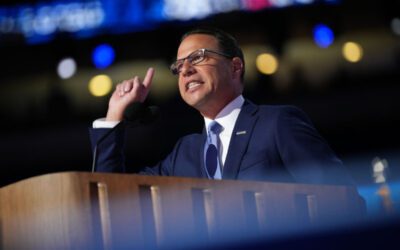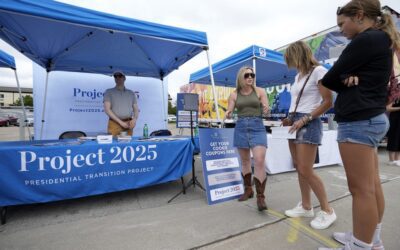
State Sen. Doug Mastriano attending a Senate panel on the COVID-19 vaccine in the Pennsylvania State Capitol on March 4, 2022. (Photo: Sean Kitchen)
The report found that 63% of Pennsylvania House Republicans and 82% of Pennsylvania Senate Republicans are election deniers.
A recent report published by States United Action found that Pennsylvania has the highest number of election deniers serving in office in the seven states they studied.
“We not only have the most amount of legislators who are election deniers in the General Assembly, we have congressmen who conspired with President Trump to overturn the election … I think we have the most January six participants who have been tried and convicted,” Kyle Miller, the Pennsylvania Policy Strategist for Protect Democracy, said in an interview. “So yeah, unfortunately we were the Keystone state in more ways than one in 2020.”
The report defines election deniers as individuals who took actions or promoted conspiracies to undermine the 2020 presidential election or later elections.
The seven state legislatures studied were Arizona, Georgia, Michigan, Nevada, New Mexico, Pennsylvania, and Wisconsin.
According to the report, there are 202 election deniers serving as legislators in those seven states and the commonwealth has the highest number of election deniers, with 87 legislators serving in the Pennsylvania General Assembly.
Close to one-third of Pennsylvania’s General Assembly is composed of election deniers who tried influencing the outcome of the 2020 election. This includes 64 members in the House, or 63% of the House Republican caucus, and 23 members in the Senate, or 82% of the Senate Republican caucus.
Most members of House and Senate Republican leadership were named as election deniers in the report. In the House, this includes Minority Leader Bryan Cutler (R-Lancaster) and State Reps. Seth Grove (R-York), George Dunbar (R-Westmoreland), Joshua Kail (R-Beaver), and Martina White (R-Philadelphia).
In the Senate, it includes Senate President Kim Ward (R-Westmoreland), Majority Leader Joe Pittman (R-Armstrong), Majority Whip Ryan Aument (R-Lancaster), Republican Chair Kristin Phillips-Hill (R-York), Republican Caucus Secretary Camera Bartolotta (R-Beaver), and Senate Appropriations Chair Scott Martin (R-Lancaster).
One prominent election denier that is seeking a promotion is State Rep. Dawn Keefer (R-York), founder of the Pennsylvania House Freedom Caucus. Keefer is currently running unopposed in the Republican primary for an open York County State Senate seat that leans very Republican.
Keefer spoke at a Stop the Steal type rally on the Pennsylvania Capitol steps in Harrisburg on Jan. 5, 2021, proclaiming that the 2020 presidential election was invalid and unlawful. Many people who attended that rally went to Washington DC the following day and participated in the riot to overturn the election results at the US Capitol.
“This is not about overturning an election for me, and it’s not changing the outcome. It is about election integrity,” Keefer said at the rally. “The election that took place in 2020 in Pennsylvania in November for President was unlawful. Unlawful, therefore it’s invalid.”
Following the 2020 election, the Trump campaign filed over 60 lawsuits in state and federal courts around the country, but were unable to produce any evidence to support their claims of voter fraud in the 2020 election. Independent analyses have also confirmed there was no widespread fraud.

JD Vance admits to spreading racist lie about immigrants
Donald Trump and JD Vance have both spread lies that Haitian migrants in Springfield, Ohio are eating pets, leading to bomb and death threats in the...

Progress or extremism: Josh Shapiro asks Americans which path they want to chart at DNC
“Today we find ourselves writing the next chapter. Will we be defined by chaos or extremism? Or will we choose a path of decency and continued...

Inside Project 2025’s Secret Training Videos
One centerpiece of that program is dozens of never-before-published videos created for Project 2025’s Presidential Administration Academy. The vast...

Billionaire CEO with history of sexist comments donated to Scott Perry and Rob Bresnahan
Congressman Scott Perry and Rob Bresnehan both received $6,600 from investment banker Ken Fisher and his wife, Sherrilyn Fisher. Fisher cost his...

Susan Wild: Project 2025 a ‘mission’ for many GOP House members
Congresswoman Susan Wild warns voters that Republicans in the US House see Project 2025 as “their mission” in an interview with The Keystone. ...





